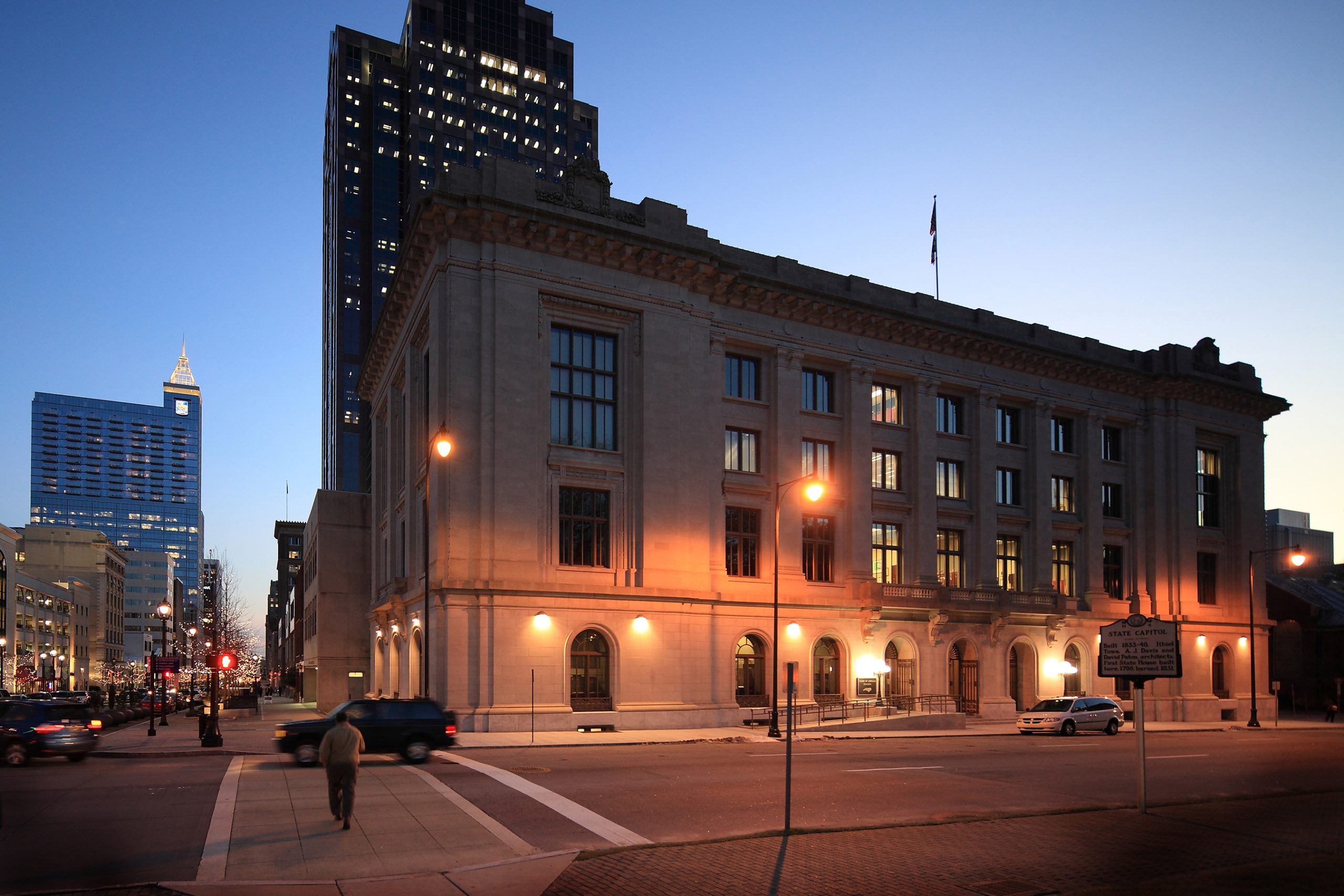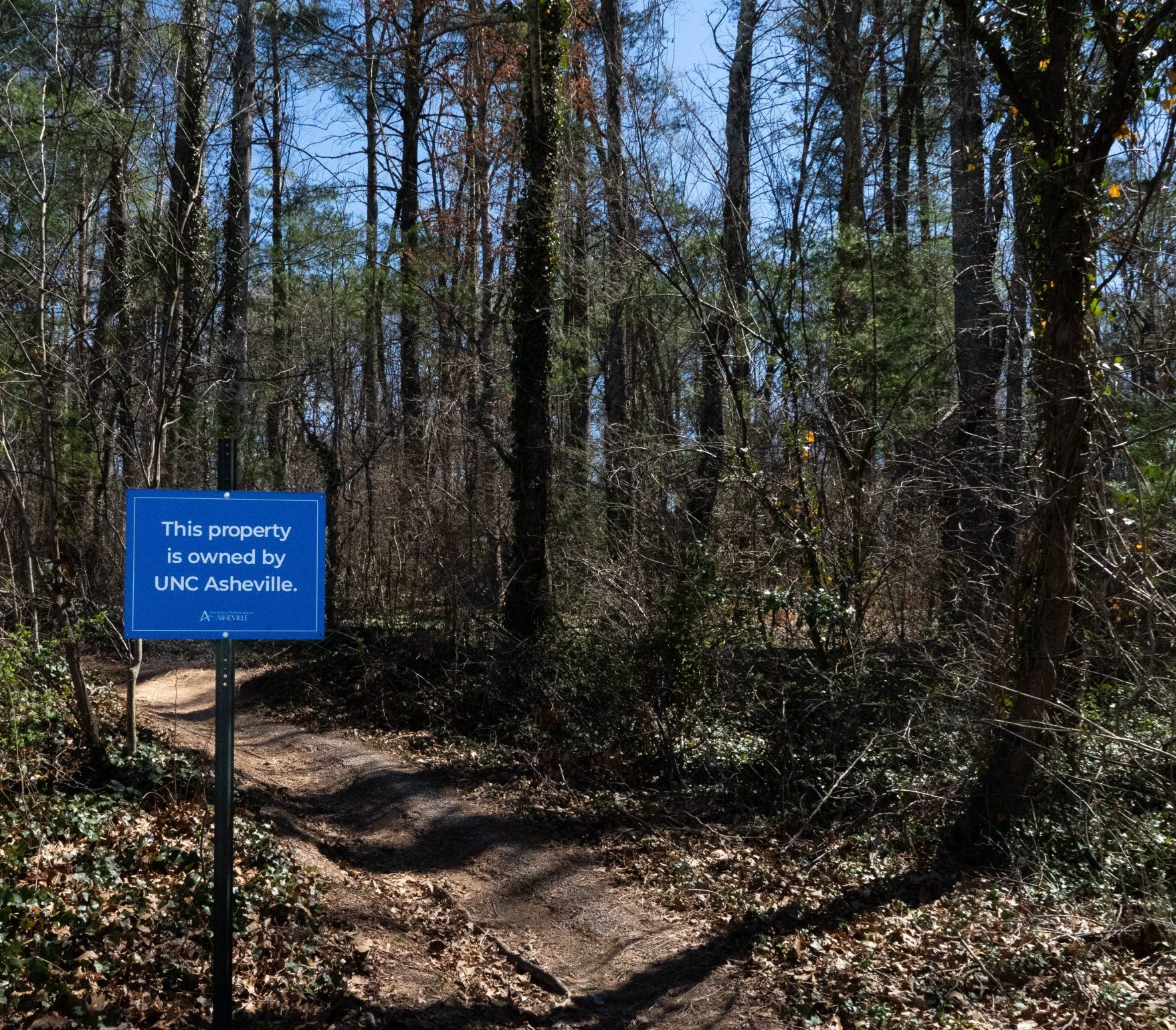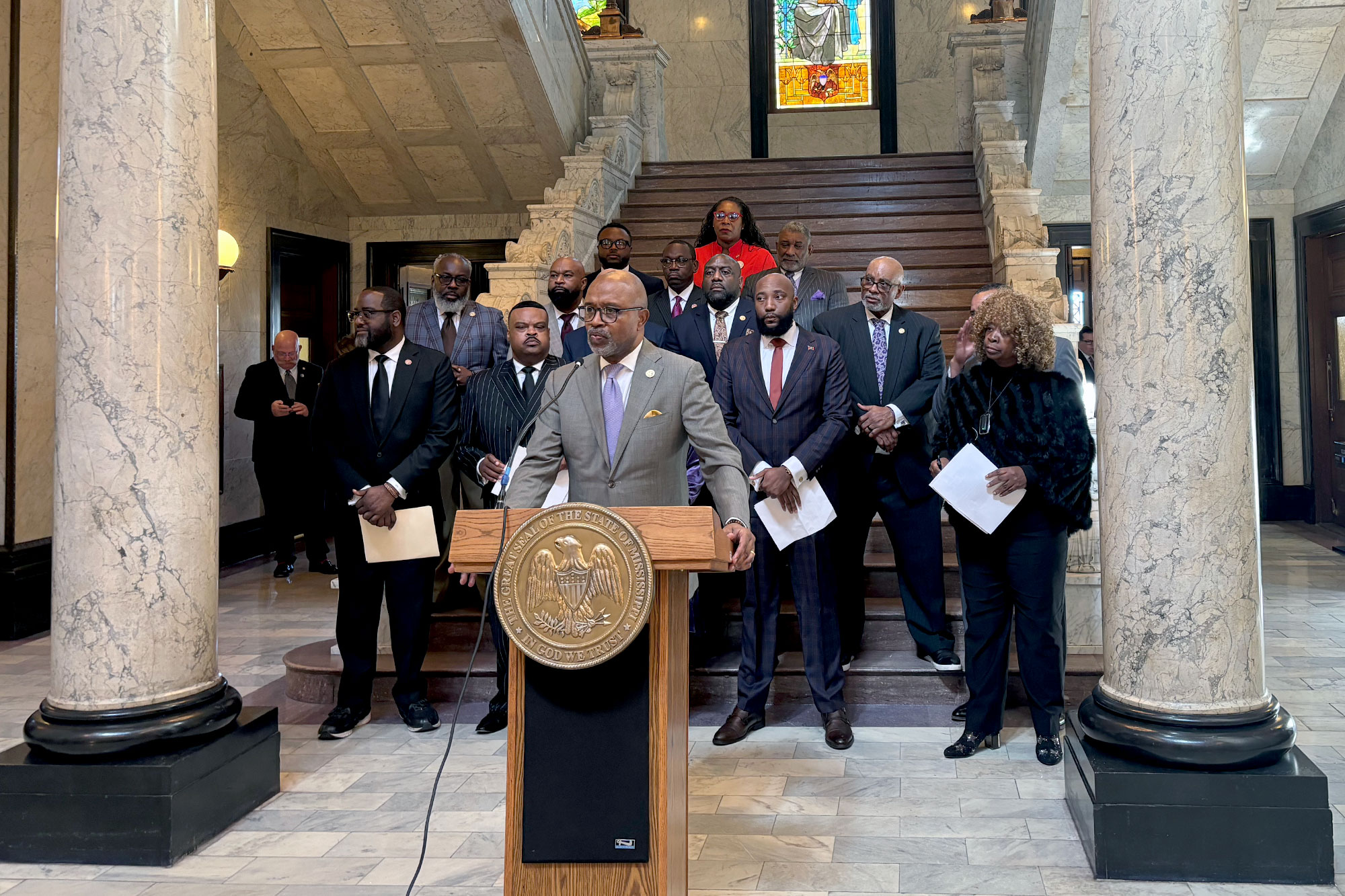As Griffin case drags on, some NC voters can’t help but feel ‘targeted’
Mahmoud Khalil still detained in Louisiana despite case being moved to New Jersey

It's Saturday, March 22, 2025, and in this edition we're covering the continuing saga of Republican Jefferson Griffin's attempt to overturn his apparent loss to Democrat Allison Riggs for a N.C. Supreme Court seat, the debate regarding a wooded area adjacent to UNC Asheville, Mississippi House Democrats assail GOP majority's plans on multiple issues, Louisiana resuming executions, Mahmoud Khalil still detained in Louisiana despite case being moved to New Jersey, U.S. Judge names Receiver to Take Over California Prisons’ Mental Health Program
Media outlets and others featured in this edition: Carolina Public Press , Asheville Watchdog, Mississippi Free Press, Bolts, Verite News, KFF Health News
To continue reading the rest of each article, please click the link at the end of the excerpt.
A new resource from the State Democracy Research Initiative makes the current text of all 50 state constitutions available and searchable on one site. This was from State Court Report.
Bolts has a guide to each state's supreme court.
For months, Griffin election protests have made their way through state and federal courts. On Friday, a three-judge panel heard the latest.
by Sarah Michels March 21, 2025
RALEIGH — In less than 24 hours, Danielle Brown left an out-of-state bus tour, came home to North Carolina to cast a vote in the 2024 general election and then boarded a plane to rejoin the tour. Now, her vote is one of nearly 67,000 ballots contested by Republican Court of Appeals Judge Jefferson Griffin as part of his attempt to overturn his apparent loss to Democratic Judge Allison Riggs for a seat on the state Supreme Court.
On Election Night, Griffin appeared to be the victor. However, as provisional and absentee ballots were counted, he slowly lost his lead. By the time election staff tallied official results during their canvasses, Riggs was up by a mere 734 votes. Two recounts confirmed Riggs’ win.
[Subscribe for FREE to Carolina Public Press’ alerts and weekend roundup newsletters]
Griffin then filed a series of election protests attempting to discard tens of thousands of ballots from the count, on grounds that the State Board of Elections illegally allowed certain categories of voters to cast a ballot. In the past four months, Griffin’s election protests have journeyed through state and federal courts.
On Friday, a panel of N.C. Court of Appeals judges heard the latest arguments and will decide whether a lower state court was right to affirm the State Board of Elections’ dismissal of Griffin’s protests.
Attorneys for Griffin, Riggs and the State Board covered much of the same territory of the past few months. Their arguments centered on whether the election rules the board established for the 2024 general election were the correct ones, and if they weren’t, whether the law allows Griffin to retroactively remove votes from the count.
Whatever the appellate court decides will be subject to appeal. The case will most likely return to the state Supreme Court, which previously paused election certification until the case is resolved but declined to take it up early.
What Griffin is disputing
Griffin is challenging ballots cast by three categories of voters.
First, he contests the ballots of over 60,000 people Griffin alleges were improperly registered to vote because they didn’t provide either a driver’s license or social security number under a faulty voter registration form. The State Board argues that voters who don’t have these numbers have to prove their identity at the polls, so their votes are valid.
Second, Griffin seeks to remove votes of about 5,500 military and overseas voters who did not include a photo ID with their absentee ballots. He argues that the State Board misinterpreted state law by allowing this category of voters to skip voter ID requirements.
Third, Griffin identified about 500 voters, who he calls “Never Residents,” who don’t live in North Carolina but claim inherited residency through a special state law provision. He argues that the state law violates the North Carolina Constitution’s residency requirements, and therefore, those votes should not count.
‘Taking it very personally’
As the case continues, more voters and organizations are getting involved. Carolina Public Press spoke to several of them.
Brown, a national co-field director for Black Voters Matter, found out that she was on the list through a text from an organization called Democracy NC. Her county board of elections told her they didn’t have her driver’s license on file, but she knows she did everything right.
Black voters like Brown are twice as likely as white voters to be in the largest Griffin challenge. Other voters of color and younger voters also disproportionately appear on his protest lists, according to an analysis conducted by Western Carolina University political science professor Chris Cooper.
“I’m taking it very personally because I do feel as if I am being targeted as a Black woman that works for a Black organization that seeks to empower voting across the country,” Brown said. “You’re making voters feel as if their vote does not count or they have to fight for their vote to count when that’s not democracy.”
Latino voters faced hurdle after hurdle this election, said Veronica Aguilar of El Pueblo, an advocacy group for that community.
The new voter ID law presents more of an obstacle for Latino voters and other voters of color than their white counterparts. Voter education tends to be in English, which may hinder the Latino community from staying updated on election rules. Also, many naturalized immigrants come from countries with different voting laws and election processes which may present a learning curve.
Additionally, Aguilar claims that Latino voters experienced voter intimidation during the election, including a proliferation of “unnecessary” signs telling them that if they aren’t citizens, they can’t vote. U.S. citizenship is required to even register to vote, she said, so this was an effort to make naturalized citizens “question whether or not they could vote.”
The fact that Latino voters disproportionately appear on the protest lists aligns with political rhetoric that immigrants “don’t belong” in the U.S., Aguilar said.
“So even if it is not intentional, it is contributing to the narrative that Latino immigrants, naturalized citizens in this country aren’t allowed to participate in our processes and that their voices don’t count,” she said.
Voters of color aren’t the only ones feeling targeted.
Carrie Conley is a military spouse living in Italy. Last year, she requested her absentee ballot through the Guilford County Board of Elections just like she had done seven times before.
Nobody ever asked for her to attach a photo ID to her absentee ballot because under the State Board’s interpretation, North Carolina law doesn’t require voter identification for military and overseas voters.
Conley heard about the Griffin case on social media, found the list and discovered her name was on it. However, none of her fellow military spouses were on the list. She soon learned that ballots from only four Democratic-leaning counties — Durham, Forsyth, Buncombe and Guilford — were being challenged as part of the photo ID protest.
“Why these four counties? Why now?” Conley asked. “It just makes me very upset that this is happening in my state.”
From 1986 to 2013, Debra Blanton served as Cleveland County’s election director. She loved her job and what it meant to voters to know that their vote would be “sacred,” “safe” and “counted correctly.”
Griffin’s attempt to retroactively take away some North Carolinians’ votes “just really raised the hairs on the back of my neck,” Blanton said.
Blanton is one of 42 former election directors who filed an amicus brief, or “friend of the court” argument, meant to offer courts additional insight.
Election directors, current or former, rarely speak publicly on issues. They make a point of being professionally nonpartisan. But Blanton has never seen anyone try to retroactively remove voters from the rolls like this before.
“It is foreign to me that anybody thinks they could attempt to do that,” she said. “There are rules in place, and the rules in place were in effect for this election.”
By the rules?
What were the rules in place for the 2024 general election?
That’s the question lawyers from Griffin, Riggs and the State Board of Elections’ teams tried to answer Friday for a panel of three N.C. Court of Appeals judges.
Were they rules the State Board established for the election, based on their interpretation of state law and the North Carolina constitution? Or were their interpretations incorrect, deeming those rules invalid?
Griffin lawyer Craig Schaeur argued in favor of the latter. The State Board can’t decide to conduct elections based on rules that violate state law and the North Carolina Constitution, he said.
“To be clear, this case is not about changing laws after the election,” Schaeur said. “It’s a case about enforcing the laws that were already on the books before the election.”
State Board lawyer Nick Brod disagreed. If the State Board’s interpretations were incorrect, there was plenty of opportunity to challenge them before the election, he argued.
The state law allowing so-called “Never Residents” to inherit the residency of their parents in order to vote was passed unanimously in 2011 and has been enforced in over 40 elections since, he explained.
The photo ID exception for overseas and military voters has been in place for five elections, he added. And the voter registration form issue that may have led to missing drivers license and social security numbers on file is currently being litigated in a federal lawsuit to apply to future elections.
“From the voters’ perspective,” Brod said, “they did everything that they were asked to do in order to cast a ballot.”
Judges Fred Gore, Toby Hampson and John Tyson will decide the case. Gore and Tyson are Republicans and Hampson is a Democrat. If the panel spits 2-1, then the case may be appealed to the state Supreme Court.

Debate over woods asks, what kind of university does UNCA want to be?
School touts commitment to transparency; critics say opaque approach to development symbolizes turn away from community
by JACK EVANS March 20, 2025
In 2004, David Clarke, a botanist who teaches in the biology department at the University of North Carolina Asheville, bought a house on Dortch Avenue, on an edge of the Five Points neighborhood that bleeds into campus. The home was still under construction when Clarke set his eye on it, he said, but “there was not a question” of whether he would buy it.
The draw, in large part, was not the property itself but across the street: 45 acres of woods, rare as a forest within the city and as a porous border between the university and the surrounding community. The woods, he explained during a recent walk through them, have long been an asset to both worlds — to professors and students who use them to study invasive plants or learn about carbon sequestration, and to the dozens of neighbors he sees walking their dogs there every day.
At every turn in the footpaths, Clarke pointed out some detail. Little red flags and shiny buttons affixed to trees marked research plots. A couple of depressions in the earth — one local historian had told him — could be the spots where horse thieves were buried centuries ago. White splotches on ivy meant a great horned owl nested somewhere in the canopy above.
But there were also features that had appeared more recently and, to Clarke and hundreds of others, disturbingly. He gestured to new paths torn through the undergrowth, to mounds of earth where machines had bored soil for testing.
These were the result of a land-assessment process UNCA launched in January. The university hadn’t publicly announced its plans, and the heavy machinery’s arrival caused alarm. Neighbors were aghast at what was in their view an assault on their natural haven, and some students and faculty complained the work disrupted their research sites.
In response to the uproar, UNCA released a written statement assuring the public that “no decisions regarding development have been made” and touting its “commitment to transparency and collaboration.”
Then, with the exception of a brief post on its website in late January announcing the end of the heavy-machinery work, the school went quiet for nearly two months.
In the absence of information, anxiety proliferated. Concerned neighbors, along with some faculty and students, protested and signed petitions. Many coalesced as a group calling itself Friends of the Woods, which has organized community meetings, filed public records requests, pursued historical research on the forest and tried in vain to meet with UNCA Chancellor Kimberly van Noort.
Read More:

Mississippi House Democrats Assail GOP Majority’s Plans on Taxes, Redistricting and More
by Heather Harrison March 21, 2025
JACKSON, Miss.— Mississippi Democrats say Republican leaders should not be focused on cutting taxing and removing DEI programs from public schools while Mississippians still do not have Medicaid expansion, robust voting rights or a ballot initiative process.
“Our health care system is strained and collapsing,” Mississippi House Democratic Minority Party leader Rep. Robert Johnson, D-Natchez, said at a press conference in the Mississippi Capitol rotunda on Feb. 25.
Mississippi House Rep. Omeria Scott, D-Laurel, noted the noise and chatter that filled the rotunda on Feb. 25 as the Democratic Caucus held its press conference. She accused Republican lawmakers of not offering the same respect for Democratic lawmakers as they offer Republican leaders who speak at the Capitol rotunda.
Tax Cuts
The Mississippi House and Senate this week sent a bill to Gov. Tate Reeves’ desk cutting income and grocery taxes while raising the gas tax. The final bill does not increase general sales taxes, however.
“I think we’re lowering the burden on Mississippi families. We’re creating a scenario where they’re going to be able to keep more of their hard-earned money, and they’ll be able to choose how they spend it,” Sen. Josh Harkins, R-Flowood, told reporters on Feb. 24.
Mississippi House Rep. Robert Johnson criticized the authors of the tax plans because he said they did not ask Democratic lawmakers how the plans could affect their districts nor did they host tax studies or hearings to determine if cutting taxes was feasible for Mississippi.
“It sounds like a show—one that could be dangerous for the people in the State of Mississippi and when you combine that with what’s happening in Washington, it’ll put a severe strain on the state’s resources and people here in the state,” Johnson said at the press conference on Feb. 25.
Mississippi House Rep. Omeria Scott, D-Laurel, spoke against cutting taxes on the House floor on Thursday, March 20. She said the Trump administration’s looming cuts to federal funding could cause Mississippi to suffer economically since Mississippi gets two-thirds of its budget from the federal government. Mississippi would not be able to make up the difference from the federal government’s decreased allocation to the State while cutting taxes if the federal government reduces spending, she argued.
“Now, the question is, as I said to you the other day: Can you make it up? Y’all, we are the poorest state in the Union, and we cannot make it up. So instead of this what you have before you, somebody should’ve brought a bill to pause that $166 million that’s coming out of your 2022 tax cut. That’s what we should’ve been doing, and we should’ve been saying, ‘Let’s wait and see what happens,’” Scott said.
Redistricting
The Mississippi Legislature needs to put “equitable redistricting at the forefront of” its priorities, Mississippi House Rep. Daryl Porter, D-Summit, said on Feb. 25. The House’s and Senate’s current proposals for redistricting make minor adjustments that “do not capture our state’s real demographics,” he said.
The House’s redistricting plan modifies Mississippi House districts 12, 22, 36, 39 and 41 while the Senate’s proposal changes Mississippi Senate districts 1, 2, 10, 11, 19, 34, 41, 42, 44 and 45. A federal court ruled that Mississippi must create more-Black majority districts around the City of Hattiesburg, DeSoto County and Chickasaw County.
Read More:

The Human Cost of Jeff Landry’s Drive to Resume Executions
Chris Duncan’s death sentence—built on the testimony of two discredited doctors—illustrates just how faulty the system can be.
Piper French | March 20, 2025
This article was produced as a collaboration between Bolts and Mother Jones.
I. “No Doubt in My Mind, Your Mind, Nobody’s Mind”
On a Saturday morning in December 1993, Jimmie Christian Duncan ran to his neighbor’s house and frantically banged on the door, pleading for help. He was holding the limp body of a toddler in his arms. The child, named Haley, belonged to Duncan’s then-girlfriend. The girl’s hair was wet. She wasn’t breathing. And even after one of the neighbors tried CPR, she wouldn’t wake.
Duncan, who goes by Chris, had just turned 25. He had a reputation around Monroe, a small city in rural northeast Louisiana. His penchant for motorcycles and head injuries—from car accidents, dirt bike crashes, bar fights—earned him a nickname: “Deathtrap Duncan.” He fought often with Haley’s mom. But he also had a sweet side: He loved to cook and would let Haley sit on the kitchen counter next to him, testing whatever he made.
As the ambulance arrived, Chris’ distress mounted to such a degree that paramedics asked one of the neighbors to take him outside. The neighbors drove him to the hospital behind the ambulance. As he was waiting for news, Haley’s grandmother showed up and accosted him. “It’s all your fault,” he remembers her shouting.
Trying to defuse the tension, police took him to the police station. When they told Chris that Haley was dead, he became irate and refused to believe them. He told officers he had given the 23-month-old a bath, then left the room to wash some dishes. When he heard a splash and a thud, he ran into the bathroom to find her face down in the tub. In the interrogation room, he just kept repeating three words over and over: “Bring her back.”
Detective Chris Sasser, a 13-year veteran officer working in the West Monroe Police Department, went to investigate. His examination of the house, a drab duplex, seemed to confirm Chris’ account: dishes in the sink, children’s toys floating in a few inches of bathwater. Based on Sasser’s investigation and Chris’ statements, police decided to charge him with negligent homicide.
But later that evening, everything changed. Sasser received a call from Steven Hayne, the Mississippi doctor tasked with the autopsy. Hayne said he and his partner, forensic odontologist Michael West, had conducted a preliminary inspection of Haley’s body. Hayne reported shocking new information: The duo concluded that Haley had likely been sexually assaulted, and they had also noticed indentations speckling the little girl’s body that appeared to be human bite marks.
Hayne’s call kicked the investigation into overdrive. Sasser upgraded the charges against Chris to first-degree murder. The next morning, he had a dentist come into the jail and cast Chris’ teeth, then drove the resulting dental molds to West in Mississippi. West reported a match: Various marks on Haley’s body, he concluded, had a “high correlation” and even a “positive match” with Chris’ teeth.
Chris spent the next four years in the Ouachita Parish jail, insisting on his innocence. In March 1998, his trial finally began. The district attorney, a powerful local figure who courted the spotlight, used language as crude as it was unsparing. During his opening statement, he told the jury, “The doctor’s going to tell you he rode that baby like a bull.” Haley had “screamed and she died in a bathtub full of water so bloody, you couldn’t see the bottom,” he said. “Red with blood.” The young court reporter, early in her career, sat just in front of the jurors. She still remembers the sound of them crying behind her.
The prosecution conjured a story of a demonic sexual frenzy, a cold-blooded decision to cover up the crime by forcibly drowning the child, silencing her for good, then a methodical obviation of the evidence. Because there was no other incriminating physical evidence to be found—no blood, no seminal fluid—the DA hammered on the bite marks, referencing them eight times in his opening statement. Chris’ lawyers tried to counter that nobody who’d examined Haley’s body before it arrived at the Mississippi morgue had noticed anything awry. But there was another damning factor: the testimony of a jailhouse informant who claimed Chris had confessed to him.
The jury deliberated for just under three hours. They prayed together. And they returned their verdict: guilty of murder in the first degree.
The DA’s characteristic bombast didn’t let up during the penalty phase, in which the 12 Ouachita Parish residents were called to decide whether Chris deserved to die. “Doubt?” he said. “There’s no doubt in my mind, your mind, nobody’s mind, he did it.”
On April 9, 1998, the jury sentenced Chris to death.
II. “No More ‘Get Out of Jail Free’ Cards.”
On March 18, at 6:50 pm local time, the state of Louisiana executed 46-year-old Jessie Hoffman Jr. by nitrogen hypoxia. Hoffman, a Black man from New Orleans, spent more than 26 years in Angola, where he grew close to Chris and others as a member of the death row community. Hoffman had become a practicing Buddhist during his time in prison. According to his lawyers, the state’s decision to gas him to death on Tuesday represented not just a form of torture but a violation of his religious freedom.
Hoffman’s killing marks a profound rupture in Louisiana: The state has not seen another contested execution since 2002. For the past two decades, executions have effectively been dormant, thanks to the glacial pace of litigation challenging the lethal injection procedure, a short supply of the required drugs, and a slight ebb in support for the practice among the state’s voters. “No one was clamoring for an execution,” Samantha Kennedy, executive director of New Orleans’ Promise of Justice Initiative, told me.
Then, in October 2023, Jeff Landry won election as governor of Louisiana. Landry is an ardent death penalty supporter and ally of President Donald Trump. He won a US House seat as part of the Tea Party wave in 2010, and after one term in Washington, he returned to Louisiana, where he served as attorney general from 2016 to 2024.
Since taking office as governor in January 2024, Landry has signed a flurry of bills functionally abolishing parole going forward, granting police greater immunity, and moving all 17-year-olds into the adult criminal system, even those accused of minor crimes. But the symbolic heart of Landry’s “tough on crime” agenda has been his drive to resume state-sponsored killings. In 2018, Landry had criticized then-Governor John Bel Edwards, a Democrat, for not doing enough to jumpstart executions. Once governor, he did not mince words: “Capital punishment is lawful, and we intend to fulfill our legal duty to resume it,” he told legislators at the start of a special legislative session on crime that he called as one of his first official acts as governor.
The session was a blitzkrieg: Over the nine days it met, the Republican-controlled legislature reauthorized execution by electrocution and legalized nitrogen hypoxia. It also passed a “secrecy statute” that shields execution procedures from scrutiny, rendering them easier to carry out and harder to challenge. In February, Landry announced that the state had formalized a protocol for nitrogen killings. Three executions were quickly scheduled back to back in March. Then, nearly as quickly, one was taken off the calendar after it became clear that the prisoner in question hadn’t exhausted his appeals. Another execution scheduled for this month didn’t happen after the 81-year-old who was slated to be killed died of natural causes.
The US Supreme Court has set legal precedent for the fact that “death is different.” Because of the finality of capital punishment, death row cases involve a lengthy appeals process that attempts to ensure that the prisoner’s rights have been upheld—that avenues of potential innocence or procedural violation have been explored, that there is truly no room left for doubt. This appeals process is where mistakes or misconduct leading to wrongful convictions may come to light and where exonerations typically happen. And Louisiana has had a stunning number of death row exonerations—11 since 1993, the year Chris was arrested.
But the governor appears to see these safeguards as something else: roadblocks.
Just before Landry’s election, he publicly criticized part of the post-conviction appeal process— specifically, a new law called Act 104, signed by Edwards, that expanded pathways for prisoners to put forth a claim of innocence. Landry called it a “woke, hug-a-thug” policy, writing: “Once a verdict has been finalized, there are no more ‘get out of jail free’ cards.”
Once Landry was in the governor’s mansion, the legislature followed suit. During the special session on crime, lawmakers limited Act 104 and heaped on additional barriers. They also restructured the public defense board, which oversees representation for people accused of crimes that can carry the death penalty, and handed control of the new board to the governor.
Read More:

Mahmoud Khalil still detained in notorious Louisiana detention center as case is moved to New Jersey
by Bobbi-Jeanne Misick March 19, 2025
Sign up for Verite's free newsletters and get the New Orleans news you need three times a week.
After former Columbia University student and permanent U.S. resident Mahmoud Khalil was detained by federal immigration officials over his involvement in student-led protests last year — a move that shocked advocates for free speech and immigrants’ rights around the country — he was taken to Jena, a small town of 4,000 in north-central Louisiana and home to one of the country’s largest and most notorious immigration detention centers.
Since last week, Khalil — a Syrian-born Palestinian and permanent U.S. resident— has been locked up in the Central Louisiana ICE Processing Center, a privately-run immigration lockup with an average daily detainee population of nearly 1,200.
Though the center’s surroundings appear peaceful and idyllic — tucked into a tall pine forest on the edge of town — it has a troubled past that includes allegations of abuse and sexual assault, excessive use of force, overuse of solitary confinement, medical mistreatment or neglect and unfit living conditions.
Earlier this month, U.S. Immigration and Customs Enforcement arrested Khalil in the lobby of his Columbia University apartment building, took him to New Jersey and quickly transferred him to Jena, more than 1,000 miles away from his pregnant wife, who is a U.S. citizen, and his attorneys in New York.
Civil rights lawyers who work with immigrants locked up in Louisiana’s detention centers say they are concerned for Khalil, given the Jena facility’s unsettling history. However, they say they are not surprised that ICE transferred Khalil to Louisiana, where access to counsel is extremely limited, and where the courts skew conservative.
In a phone interview with Verite News last week, Anthony Enriquez, vice president of U.S. advocacy and litigation at civil rights nonprofit RFK Human Rights, said the Trump Administration is “forum shopping” Khalil’s deportation case — looking for the jurisdiction that will give the government the outcome it wants.
“The government has the ability to do that with immigration,” Enriquez said. “It can arrest someone in a jurisdiction where the case law is very favorable to the person arrested, and then sweep them away to another jurisdiction.”
Khalil’s attorneys are eager to get the case, and Khalil, out of Louisiana. On Monday (March 17), his attorneys asked a federal judge to transfer the case. On Wednesday, the judge obliged, ordering the case transferred to New Jersey. The New York Times reported that the order would not have an immediate effect on where he is being detained. A federal judge in New Jersey will have to make a decision on whether to transfer him out of Louisiana.
Khalil’s legal team did not respond to requests for comment.
Representatives from the Department of Justice, ICE and the Department of Homeland Security did not immediately respond to requests from Verite News for comment on Khalil’s case or on immigration detention centers in Louisiana.
‘The black hole’
Nora Ahmed, legal director of the ACLU of Louisiana, said she has visited Khalil in Jena since he was transferred there — a four hour drive from her office in New Orleans.
She stressed the challenge that Louisiana’s “handful” of immigration attorneys who represent immigrants in detention face getting to their clients in remote areas.
The Central Louisiana ICE Processing Center, where Khalil is detained, is more than 100 miles from Baton Rouge, the closest major city.
“[Louisiana is] the place where you can cut off from outside eyes,” Enriquez said. “That’s the place where you can ensure that they won’t have access to lawyers or to advocates.”
Court filings reveal Khalil’s wife, Noor Abdalla, who cannot fly to Louisiana as she is in the last stage of pregnancy, is concerned about her husband’s well-being in Jena. She said her husband, who is Muslim and fasting for Ramadan, is finding it hard to sustain himself on the food provided to him after he breaks his fast at the end of each day. According to Abdalla, Khalil did not receive his daily medication for an ulcer until two days after he arrived in Jena.
“I also worry about Mahmoud braving this period of detention,” Abdalla said in a sworn statement of support. “I cannot overstate how distressing this entire experience has been. … This experience has flipped our lives upside down.”
The Jena facility, operated by private prison corporation GEO Group – ICE’s single largest private contractor – has been plagued with allegations of abuse and mistreatment since the late 1990s when it opened as a juvenile correctional center. In 2000, the federal government closed the facility, operated when GEO Group went by a different name, Wackenhut Corrections Corporation, for “excessive abuse and neglect,” including the use of chemical weapons on children.
Last year, the ACLU of Louisiana and RFK Human Rights co-produced a report on the Louisiana immigration detention system called “Inside the Black Hole” that featured information gathered from interviews with more than 6,000 detainees over roughly two years. Prominent features of the report include prison-like settings, inadequate mental health and medical care, allegations of human rights abuses, and extremely limited access to language interpretation services and to attorneys.
Immigrants detained at the Jena facility reported rodent droppings on the facility’s kitchen surfaces, human excrement in a shower area and allegations of prolonged isolation leading to medical and mental health distress.
Read More:

US Judge Names Receiver To Take Over California Prisons’ Mental Health Program
SACRAMENTO, Calif. — A judge has initiated a federal court takeover of California’s troubled prison mental health system by naming the former head of the Federal Bureau of Prisons to serve as receiver, giving her four months to craft a plan to provide adequate care for tens of thousands of prisoners with serious mental illness.
Senior U.S. District Judge Kimberly Mueller issued her order March 19, identifying Colette Peters as the nominated receiver. Peters, who was Oregon’s first female corrections director and known as a reformer, ran the scandal-plagued federal prison system for 30 months until President Donald Trump took office in January. During her tenure, she closed a women’s prison in Dublin, east of Oakland, that had become known as the “rape club.”
Michael Bien, who represents prisoners with mental illness in the long-running prison lawsuit, said Peters is a good choice. Bien said Peters’ time in Oregon and Washington, D.C., showed that she “kind of buys into the fact that there are things we can do better in the American system.”
“We took strong objection to many things that happened under her tenure at the BOP, but I do think that this is a different job and she’s capable of doing it,” said Bien, whose firm also represents women who were housed at the shuttered federal women’s prison.
California corrections officials called Peters “highly qualified” in a statement, while Gov. Gavin Newsom’s office did not immediately comment. Mueller gave the parties until March 28 to show cause why Peters should not be appointed.
Peters is not talking to the media at this time, Bien said. The judge said Peters is to be paid $400,000 a year, prorated for the four-month period.
About 34,000 people incarcerated in California prisons have been diagnosed with serious mental illnesses, representing more than a third of California’s prison population, who face harm because of the state’s noncompliance, Mueller said.
Appointing a receiver is a rare step taken when federal judges feel they have exhausted other options. A receiver took control of Alabama’s correctional system in 1976, and they have otherwise been used to govern prisons and jails only about a dozen times, mostly to combat poor conditions caused by overcrowding. Attorneys representing inmates in Arizona have asked a judge to take over prison health care there.
Mueller’s appointment of a receiver comes nearly 20 years after a different federal judge seized control of California’s prison medical system and installed a receiver, currently J. Clark Kelso, with broad powers to hire, fire, and spend the state’s money.
California officials initially said in August that they would not oppose a receivership for the mental health program provided that the receiver was also Kelso, saying then that federal control “has successfully transformed medical care” in California prisons. But Kelso withdrew from consideration in September, as did two subsequent candidates. Kelso said he could not act “zealously and with fidelity as receiver in both cases.”
Both cases have been running for so long that they are now overseen by a second generation of judges. The original federal judges, in a legal battle that reached the U.S. Supreme Court, more than a decade ago forced California to significantly reduce prison crowding in a bid to improve medical and mental health care for incarcerated people.
State officials in court filings defended their improvements over the decades. Prisoners’ attorneys countered that treatment remains poor, as evidenced in part by the system’s record-high suicide rate, topping 31 suicides per 100,000 prisoners, nearly double that in federal prisons.
“More than a quarter of the 30 class-members who died by suicide in 2023 received inadequate care because of understaffing,” prisoners’ attorneys wrote in January, citing the prison system’s own analysis. One prisoner did not receive mental health appointments for seven months “before he hanged himself with a bedsheet.”
They argued that the November passage of a ballot measure increasing criminal penalties for some drug and theft crimes is likely to increase the prison population and worsen staffing shortages.
California officials argued in January that Mueller isn’t legally justified in appointing a receiver because “progress has been slow at times but it has not stalled.”
Mueller has countered that she had no choice but to appoint an outside professional to run the prisons’ mental health program, given officials’ intransigence even after she held top officials in contempt of court and levied fines topping $110 million in June. Those extreme actions, she said, only triggered more delays.
The 9th U.S. Circuit Court of Appeals on March 19 upheld Mueller’s contempt ruling but said she didn’t sufficiently justify calculating the fines by doubling the state’s monthly salary savings from understaffing prisons. It upheld the fines to the extent that they reflect the state’s actual salary savings but sent the case back to Mueller to justify any higher penalty.
Mueller had been set to begin additional civil contempt proceedings against state officials for their failure to meet two other court requirements: adequately staffing the prison system’s psychiatric inpatient program and improving suicide prevention measures. Those could bring additional fines topping tens of millions of dollars.
But she said her initial contempt order has not had the intended effect of compelling compliance. Mueller wrote as far back as July that additional contempt rulings would also be likely to be ineffective as state officials continued to appeal and seek delays, leading “to even more unending litigation, litigation, litigation.”
She went on to foreshadow her latest order naming a receiver in a preliminary order: “There is one step the court has taken great pains to avoid. But at this point,” Mueller wrote, “the court concludes the only way to achieve full compliance in this action is for the court to appoint its own receiver.”
This article was produced by KFF Health News, which publishes California Healthline, an editorially independent service of the California Health Care Foundation.
If you or someone you know may be experiencing a mental health crisis, contact the 988 Suicide & Crisis Lifeline by dialing or texting “988.”
KFF Health News is a national newsroom that produces in-depth journalism about health issues and is one of the core operating programs at KFF—an independent source of health policy research, polling, and journalism. Learn more about KFF.
USE OUR CONTENT
This story can be republished for free (details).
KFF Health News is a national newsroom that produces in-depth journalism about health issues and is one of the core operating programs at KFF—an independent source of health policy research, polling, and journalism. Learn more about KFF.Subscribe to KFF Health News' free Morning Briefing.
This article first appeared on KFF Health News and is republished here under a Creative Commons license.![]()









